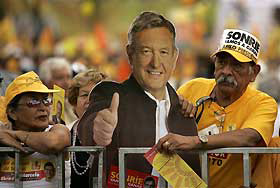 |
 |
 |
 News Around the Republic of Mexico | July 2006 News Around the Republic of Mexico | July 2006  
Agency Says Mexico's Election Results will be Clear, Fair
 S. Lynne Walker - Copley News S. Lynne Walker - Copley News


| | A cut-out poster of Mexican presidential candidate Andres Manuel Lopez Obrador stands in between two supporters during a rally in Mexico City. While some analysts criticized the campaigns for attack ads and pandering, others saw it as simply politics coming of age in the mass media era. (Associated Press) |
Mexico City – As Mexicans prepare to cast their ballots Sunday in the presidential election, the spotlight has shifted from the three candidates to the electoral agency that will reveal which of them is the winner.

The Federal Electoral Institute, or IFE, is the agency Mexicans are relying on to make sure the election results are unassailable.

With the candidates so close that it's impossible to predict a winner, the IFE must be sure that every step of the voting process is so meticulously carried out that Mexicans believe the agency when it announces the name of their next president.

Sunday's election is a critical test for the IFE.

If things go smoothly, the election will likely solidify the political gains Mexico has made since voting six years ago to end the 71-year rule of the Institutional Revolutionary Party, or PRI.

If the election's validity is questioned and the results are delayed until the legal limit of Sept. 6, political analysts say Mexico could face a period of unrest and economic instability.
IFE President Luis Carlos Ugalde understands how much is at stake. For two years, his agency has been preparing for this day.

In a full-page advertisement published yesterday in Mexico City's major newspapers, the IFE outlined every possible election scenario so there will be no surprises.

The first and most likely scenario is that at 11 p.m. (9 p.m. PDT) on election night, the IFE will announce the winner.

The second is that the IFE will report the results are so close it can't declare a winner.

The third scenario is that the IFE will tell voters that the agency needs two additional hours to determine a winner.

A final scenario is that the IFE will say it doesn't have the statistical information necessary to make an announcement about tendencies in the presidential election.

The IFE says its well-rehearsed system of tallying the vote – known as the quick count, with a razor-thin margin of error of 0.3 percent – will allow the agency to accurately predict a winner.

“The IFE is ready to conduct the election on July 2,” Ugalde said during a meeting with foreign correspondents yesterday. The IFE, which became independent of the federal government 10 years ago, is one of Mexico's most trusted agencies.

In a survey conducted by the polling firm Consulta Mitofsky, the IFE had a 70 percent confidence rating, ranking higher than President Vicente Fox.

In general, Mexicans believe their vote is secret and that they're free to vote for whomever they choose. They also believe the IFE will be impartial in the election and declare the true winner, just as it did six years ago with Fox.

With the race so close, the IFE's role becomes even more important.

Leftist Andrés Manuel López Obrador of the Democratic Revolution Party was slightly ahead, with 36 percent, in several polls published last Friday.

His closest rival, Felipe Calderón from Fox's National Action Party, had 34 percent. Roberto Madrazo of the PRI was third with 25 percent.

The IFE has reported some problems in election preparations.

Roughly 21 percent of the nation's 130,000 polling places have been forced to replace poll workers who had been trained to work on Sunday. However, almost all of the workers were alternates, who are present at the polls in case regular workers can't perform their duties, IFE Commissioner Alejandra Latapi said.

At 12 polling places, the IFE hasn't been able to find enough workers.

The voter registration roll lists 71 million voters. But about 1 million of those voters have died, Ugalde said.

Although López Obrador urged supporters during his final campaign rally Wednesday to help him win by a big margin, a political analyst said he appears to be laying the groundwork for a challenge to the election if he doesn't emerge as the winner.

“We've seen it going on for months, his undermining the IFE,” said George Grayson, a Mexico scholar at the College of William & Mary.

“If López Obrador loses by fewer than 5 percentage points, I think he's going to contest the election. He may go on TV and ask his followers to follow the law. But I think there are going to be ugly demonstrations, particularly in Mexico City and the south.”

Roy Campos, president of Consulta Mitofsky, believes Mexican voters will accept the results of the presidential election, even if their candidate does not win.

“There will be conflicts in some local elections, but not in the presidential race,” he said.

Campos believes that when Mexicans go to bed Sunday, they will know who won the presidency.

“There will be so much information that we are going to know what is going to happen,” he said. “This is the moment for the citizens to decide the election.”

S. Lynne Walker: slwalker@prodigy.net.mx | 
 | |
 |



